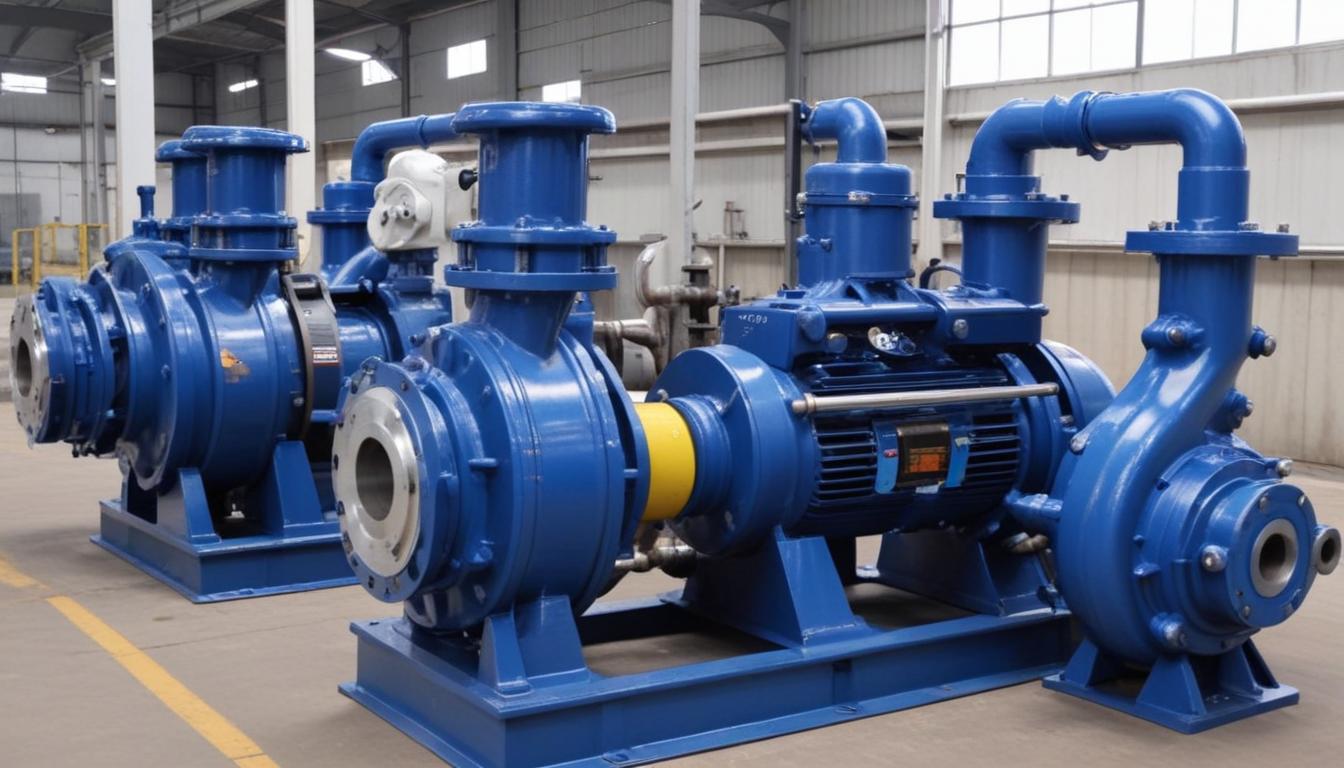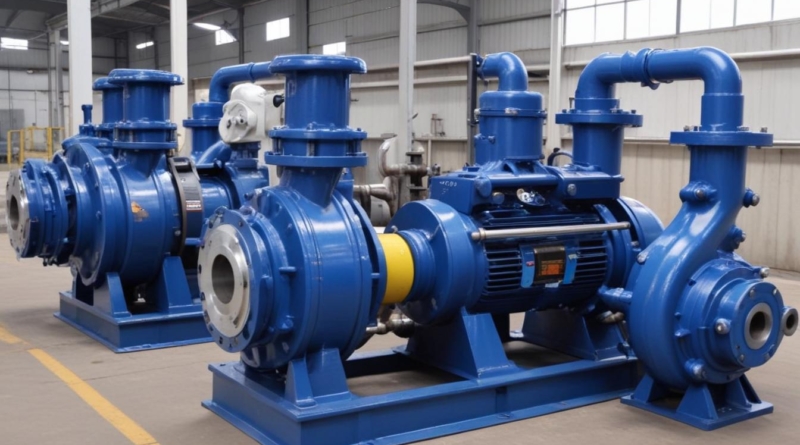the benefits of using magnetic drive pumps in chemical industries
Magnetic drive pumps provide a superior leak-free operation, which is essential in the chemical industries where handling hazardous and corrosive fluids is commonplace. Traditional pump designs often rely on mechanical seals and gaskets that are susceptible to wear and tear, leading to potential leaks that can compromise both safety and product integrity. By eliminating the need for these dynamic seals, magnetic drive pumps significantly reduce the risk of leakage, ensuring a secure and reliable pumping process.
| Feature | Magnetic Drive Pumps | Traditional Pumps |
|---|---|---|
| Seal Mechanism | Sealed magnetic coupling | Mechanical seals and gaskets |
| Leak Risk | Minimal | Higher due to seal wear |
| Maintenance Requirements | Lower | Higher due to seal replacement |
The design of magnetic drive pumps incorporates a sealed magnetic coupling that transmits torque without direct contact between the motor and the fluid, effectively preventing any leakage paths. This innovative approach not only enhances containment of aggressive chemicals, reducing environmental and safety hazards, but also maintains product purity by minimizing the risk of contamination. Additionally, the reduced need for frequent maintenance and seal replacements translates to decreased operational downtime and lower overall maintenance costs.
- Enhanced containment of hazardous fluids
- Reduction in environmental and safety risks
- Improved product integrity and compliance with industry standards
- Lower maintenance and operational costs
Overall, the leak-free operation of magnetic drive pumps offers significant benefits for chemical processing applications, ensuring both operational efficiency and adherence to stringent safety regulations.
enhanced safety features
Magnetic drive pumps incorporate several advanced safety mechanisms that make them highly suitable for use in the chemical industries. One of the primary safety enhancements is the elimination of traditional mechanical seals. By utilizing a sealed magnetic coupling, these pumps prevent any direct contact between the motor and the processed fluid, thereby removing potential leakage points. This design drastically reduces the risk of exposure to hazardous chemicals, safeguarding both personnel and the environment.
Additionally, magnetic drive pumps are equipped with integrated safety features that monitor and control operational parameters to prevent accidents. For instance, many models include:
- Over-temperature protection: Automatically shuts down the pump if temperatures exceed safe limits, preventing thermal damage and potential hazards.
- Pressure relief systems: Activate to release excess pressure, maintaining system integrity and avoiding rupture or spills.
- Automated shut-off mechanisms: Engage in the event of a power failure or system malfunction, ensuring that the pump does not operate under unsafe conditions.
| Safety Feature | Magnetic Drive Pumps | Traditional Pumps |
|---|---|---|
| Leak Prevention | Sealed magnetic coupling eliminates leaks | Mechanical seals prone to leaks |
| Operational Monitoring | Integrated sensors for temperature and pressure | External monitoring required |
| Emergency Shutdown | Automated and rapid response systems | Manual or delayed responses |
The benefits of these enhanced safety features extend beyond mere compliance with industry standards. They contribute to a more reliable and secure operational environment by minimizing the chances of accidental releases of hazardous substances. This not only protects employees and surrounding communities but also helps companies avoid costly downtime and potential legal liabilities associated with safety breaches.
Moreover, the robust construction and design of magnetic drive pumps ensure that they can withstand the demanding conditions often found in chemical processing environments. Their ability to handle aggressive chemicals without degradation further enhances overall safety by reducing the likelihood of pump failures that could lead to unsafe situations.
In summary, the enhanced safety features of magnetic drive pumps provide substantial advantages for the chemical industries, offering a secure and dependable solution that prioritizes the well-being of both people and the environment.
reduced maintenance requirements
Magnetic drive pumps are renowned for their minimal maintenance needs, making them an excellent choice for the chemical industries where operational reliability is paramount. Unlike traditional pumps that rely on numerous moving parts and mechanical seals, magnetic drive pumps feature a simpler design that inherently reduces the potential for wear and mechanical failure. This streamlined construction translates into fewer maintenance tasks and lower associated costs.
One of the key factors contributing to reduced maintenance is the absence of mechanical seals. Traditional pumps require regular inspection and replacement of seals, which are often the first components to fail due to the abrasive and corrosive nature of chemicals handled. In contrast, magnetic drive pumps utilize a sealed magnetic coupling that remains intact for extended periods, eliminating the need for frequent seal maintenance.
Additionally, the robust design of magnetic drive pumps minimizes the accumulation of deposits and scaling, common issues in chemical processing environments. This characteristic not only prolongs the lifespan of the pump but also ensures consistent performance without the need for constant cleaning or servicing.
| Maintenance Aspect | Magnetic Drive Pumps | Traditional Pumps |
|---|---|---|
| Frequency of Seal Replacement | Low | High |
| Parts Requiring Regular Inspection | Minimal | Multiple, including seals and gaskets |
| Downtime for Maintenance | Reduced | Increased |
| Overall Maintenance Costs | Lower | Higher |
The efficiency in design also extends to the ease of access for routine checks and minor adjustments. Magnetic drive pumps are often constructed with accessibility in mind, allowing maintenance personnel to perform necessary tasks quickly and efficiently without extensive disassembly. This ease of maintenance not only reduces labor costs but also minimizes the time the pump is out of service, enhancing overall operational productivity.
- Fewer Moving Parts: Reduced mechanical complexity leads to less wear and tear.
- Sealed Magnetic Coupling: Eliminates the need for dynamic seals, lowering maintenance requirements.
- Corrosion-Resistant Materials: Prolongs pump lifespan and reduces the frequency of part replacements.
- Automated Monitoring Systems: Early detection of potential issues allows for proactive maintenance.
Moreover, the integration of advanced monitoring technologies in magnetic drive pumps provides real-time data on pump performance and condition. This proactive approach enables early identification of potential issues, allowing for timely interventions before they escalate into significant problems. Predictive maintenance strategies supported by these monitoring systems further enhance the reliability and longevity of the pumps.
The benefits of reduced maintenance extend beyond cost savings. They include increased operational uptime, enhanced reliability, and the ability to allocate resources more efficiently. In environments where continuous processing is critical, such as in the chemical industries, these advantages can lead to substantial improvements in overall productivity and profitability.
In summary, the reduced maintenance requirements of magnetic drive pumps provide significant advantages for the chemical industries, offering a cost-effective and reliable solution that supports sustained operational excellence.
increased chemical resistance
 Magnetic drive pumps are engineered with materials that exhibit superior resistance to a wide range of corrosive chemicals, making them exceptionally well-suited for applications within the chemical industries. The selection of construction materials is critical in environments where aggressive substances are handled, as it directly impacts the longevity and reliability of the pumping system. By utilizing corrosion-resistant alloys and specialized coatings, these pumps can withstand harsh chemical conditions without degrading, ensuring consistent performance and minimizing the risk of contamination.
Magnetic drive pumps are engineered with materials that exhibit superior resistance to a wide range of corrosive chemicals, making them exceptionally well-suited for applications within the chemical industries. The selection of construction materials is critical in environments where aggressive substances are handled, as it directly impacts the longevity and reliability of the pumping system. By utilizing corrosion-resistant alloys and specialized coatings, these pumps can withstand harsh chemical conditions without degrading, ensuring consistent performance and minimizing the risk of contamination.
Material Selection is a cornerstone of the chemical resistance offered by magnetic drive pumps. Commonly used materials include:
- Stainless Steel: Provides excellent resistance to many acids and bases, making it ideal for a variety of chemical processes.
- Hastelloy: Known for its exceptional resistance to chloride-induced stress corrosion cracking, suitable for highly corrosive environments.
- Teflon Coatings: Offer a non-reactive surface that prevents chemical reactions with the pumped substances, enhancing longevity.
- PTFE (Polytetrafluoroethylene): Utilized in seals and gaskets to ensure compatibility with aggressive chemicals without compromising integrity.
The robustness of these materials ensures that magnetic drive pumps can handle a diverse array of chemicals, including:
| Chemical | Compatibility with Magnetic Drive Pumps | Notes |
|---|---|---|
| Hydrochloric Acid | Highly Resistant | Suitable materials include Hastelloy and PTFE-lined components. |
| Sulfuric Acid | Highly Resistant | Stainless steel variants with appropriate coatings are recommended. |
| Sodium Hydroxide | Moderately Resistant | Requires specific stainless steel grades and protective coatings. |
| Organic Solvents | Variable Resistance | Compatibility depends on solvent type; consult material guidelines. |
Moreover, the benefits of increased chemical resistance extend beyond mere material durability. Enhanced chemical resistance contributes to:
- Extended Equipment Lifespan: Reduces the frequency of pump replacements and repairs, leading to cost savings.
- Consistent Performance: Maintains optimal pump efficiency by preventing material degradation that can impair functionality.
- Reduced Downtime: Minimizes unexpected failures, ensuring continuous operation in critical chemical processes.
- Environmental Compliance: Helps in adhering to strict environmental regulations by preventing leaks and emissions caused by material corrosion.
Additionally, the adaptability of magnetic drive pumps to various chemical environments is enhanced by their modular design. Components can be easily swapped or upgraded to accommodate different chemical requirements without necessitating a complete system overhaul. This flexibility is particularly advantageous in the chemical industries, where processes may involve multiple chemicals with varying levels of corrosiveness.
Corrosion Protection Technologies employed in magnetic drive pumps further bolster their chemical resistance. Techniques such as cathodic protection, advanced surface treatments, and the application of barrier coatings ensure that the internal surfaces of the pump remain free from corrosive attack. These technologies work in tandem with high-grade materials to provide a comprehensive defense against chemical degradation.
In summary, the enhanced chemical resistance of magnetic drive pumps offers substantial benefits for the chemical industries, including improved durability, reliability, and operational efficiency. By leveraging advanced materials and protective technologies, these pumps deliver a resilient solution capable of handling the most demanding chemical environments with ease.
energy efficiency advantages
Magnetic drive pumps are engineered to deliver substantial energy savings compared to conventional pumping systems. Their streamlined design reduces energy loss by minimizing friction and eliminating mechanical inefficiencies inherent in traditional pumps. In standard pumps, mechanical seals and additional moving parts contribute to energy dissipation through heat and wear. Magnetic drive pumps, however, sidestep these issues by removing the need for such seals, thereby enhancing overall system efficiency.
Key Energy Efficiency Benefits:
- Reduced Mechanical Losses: The elimination of mechanical seals and dynamic couplings decreases energy loss caused by friction and mechanical drag.
- Optimized Motor Performance: Magnetic drive pumps often incorporate high-efficiency motors designed for continuous operation, resulting in lower energy consumption.
- Improved Pump Design: Streamlined flow paths and precision engineering facilitate more efficient fluid movement, requiring less energy to achieve desired flow rates and pressures.
- Variable Speed Capabilities: Compatibility with variable frequency drives (VFDs) allows for precise control of pump speed, reducing energy usage during periods of lower demand.
A comparative analysis of energy consumption between magnetic drive pumps and traditional pumps highlights these efficiency advantages:
| Aspect | Magnetic Drive Pumps | Traditional Pumps |
|---|---|---|
| Energy Consumption | Lower due to reduced friction and mechanical losses | Higher due to additional moving parts and seals |
| Motor Efficiency | Typically higher with energy-efficient motors | Variable, often lower without optimization |
| Operational Costs | Reduced energy bills | Higher energy expenses |
| Potential for Renewable Integration | Easier integration with renewable energy sources | More challenging due to less efficient design |
Additionally, the adoption of magnetic drive pumps in the chemical industries supports sustainability initiatives by lowering the overall carbon footprint associated with pumping operations. Reduced energy requirements not only decrease operational costs but also help meet regulatory standards aimed at energy conservation and the reduction of greenhouse gas emissions.
Additional Energy Efficiency Features:
- High-Efficiency Hydraulics: Designed to maximize flow and minimize resistance, ensuring effective energy conversion into useful work.
- Low Power Standby: Advanced control systems enable pumps to enter low-power states when not in active use, conserving energy without compromising readiness.
- Thermal Management: Efficient cooling systems reduce the energy required to manage heat generation, further enhancing overall pump efficiency.
The integration of these energy-efficient features underscores the advantages of utilizing magnetic drive pumps within chemical processing facilities. By optimizing energy usage, these pumps not only lower operational expenses but also promote environmentally responsible manufacturing practices.
In summary, the energy efficiency advantages of magnetic drive pumps present a compelling case for their adoption in the chemical industries. The benefits extend beyond cost savings to include enhanced sustainability and compliance with energy regulations, making them a strategic investment for modern chemical processing operations.



